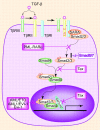Role of transforming growth factor-beta in hematologic malignancies
- PMID: 16484590
- PMCID: PMC1895802
- DOI: 10.1182/blood-2005-10-4169
Role of transforming growth factor-beta in hematologic malignancies
Abstract
The transforming growth factor-beta (TGF-beta) signaling pathway is an essential regulator of cellular processes, including proliferation, differentiation, migration, and cell survival. During hematopoiesis, the TGF-beta signaling pathway is a potent negative regulator of proliferation while stimulating differentiation and apoptosis when appropriate. In hematologic malignancies, including leukemias, myeloproliferative disorders, lymphomas, and multiple myeloma, resistance to these homeostatic effects of TGF-beta develops. Mechanisms for this resistance include mutation or deletion of members of the TGF-beta signaling pathway and disruption of the pathway by oncoproteins. These alterations define a tumor suppressor role for the TGF-beta pathway in human hematologic malignancies. On the other hand, elevated levels of TGF-beta can promote myelofibrosis and the pathogenesis of some hematologic malignancies through their effects on the stroma and immune system. Advances in the TGF-beta signaling field should enable targeting of the TGF-beta signaling pathway for the treatment of hematologic malignancies.
Figures

References
-
- Elliott RL, Blobe GC. Role of transforming growth factor Beta in human cancer. J Clin Oncol. 2005;23: 2078-2093. - PubMed
-
- Attisano L, Wrana JL. Signal transduction by the TGF-beta superfamily. Science. 2002;296: 1646-1647. - PubMed
-
- Shi Y, Massague J. Mechanisms of TGF-beta signaling from cell membrane to the nucleus. Cell. 2003;113: 685-700. - PubMed
-
- Derynck R, Zhang YE. Smad-dependent and Smad-independent pathways in TGF-beta family signalling. Nature. 2003;425: 577-584. - PubMed
Publication types
MeSH terms
Substances
Grants and funding
LinkOut - more resources
Full Text Sources
Other Literature Sources

